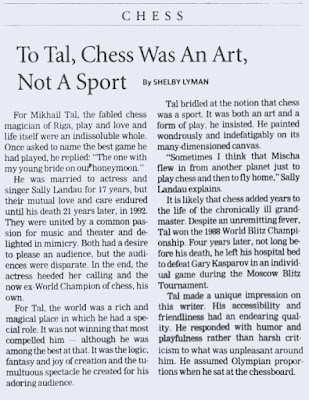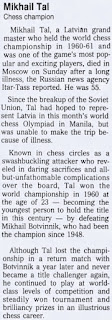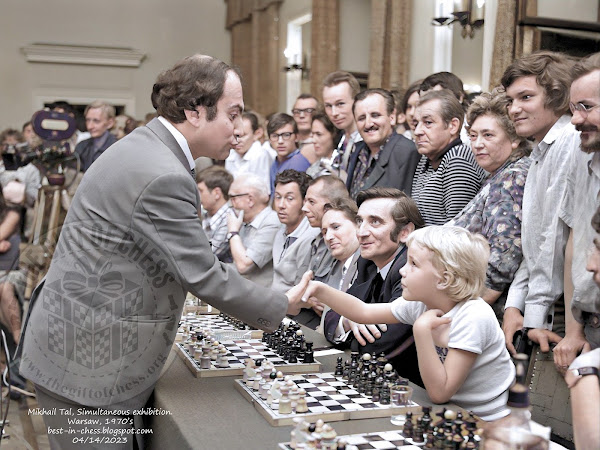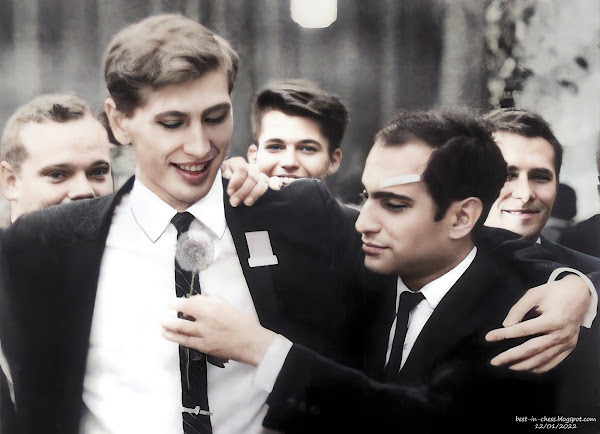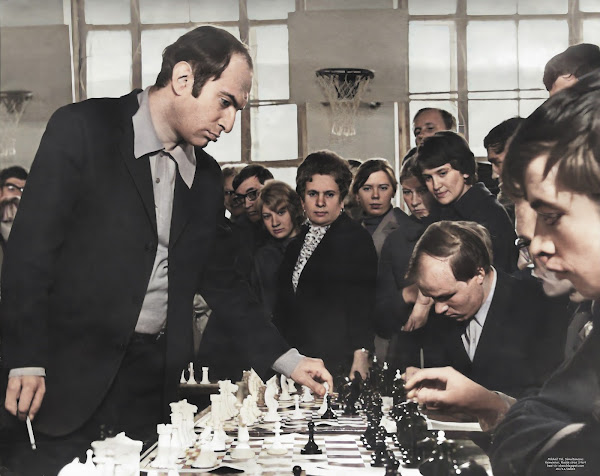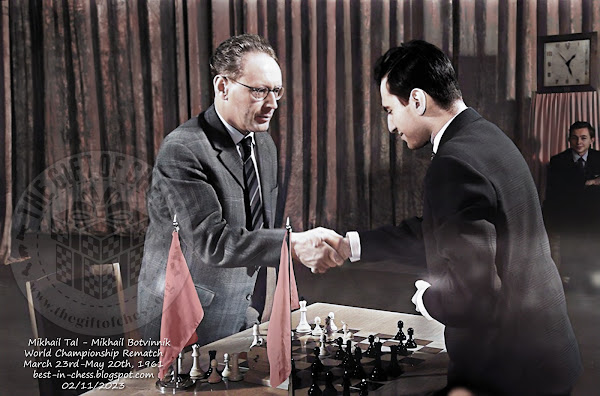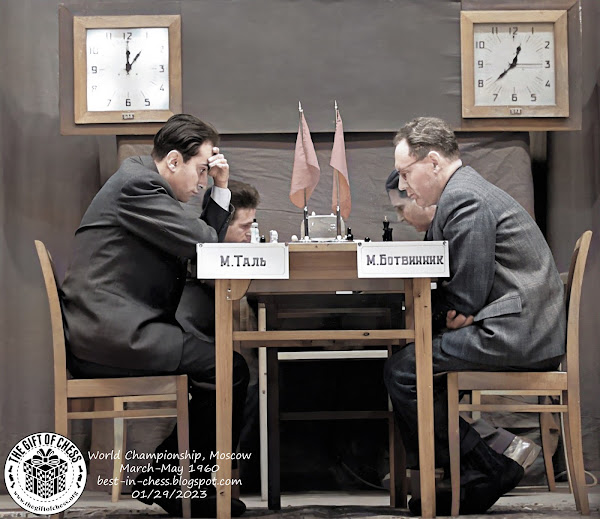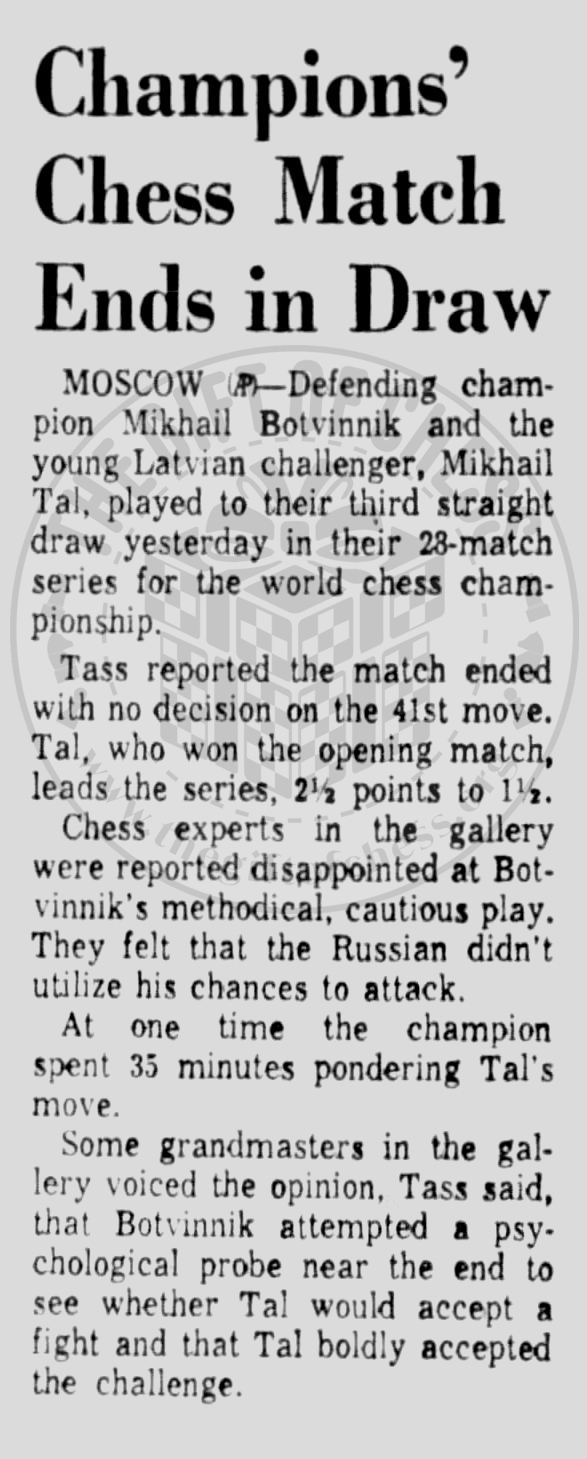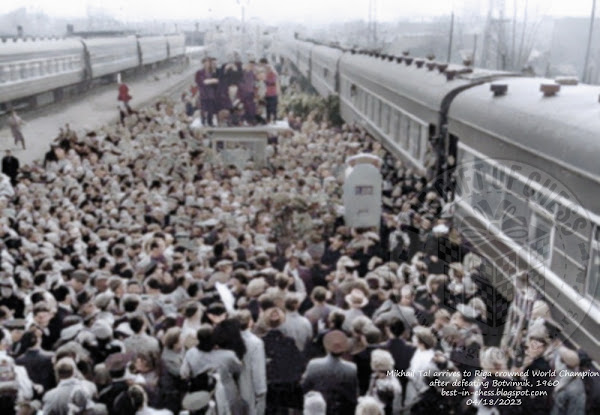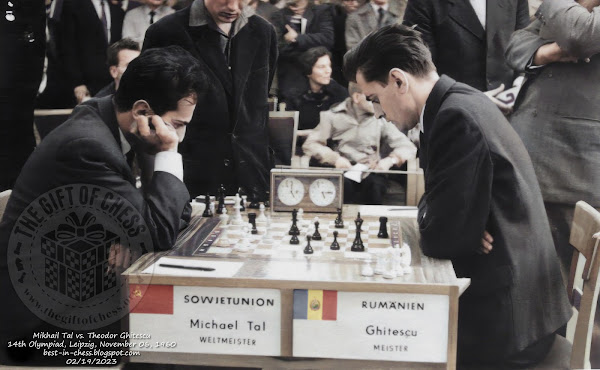Back to Home Index
March 1960
March 18 1960
St. Louis Post-Dispatch, St. Louis, Missouri, Friday, March 18, 1960
Second Chess Game Drawn
©New York Times News Service
New York, March 18—The second game in the match for world chess championship would up in a draw last night between Mikhail Botvinnik, titleholder, and Mikhail Tal of Latvia, the challenger. Botvinnik had white in a queen's pawn game which Tal opposed with a Benoni counter development. The draw came after 44 moves.
March 23 1960
Asbury Park Press, Asbury Park, New Jersey, Wednesday, March 23, 1960
Champions' Chess Match Ends in Draw
MOSCOW (AP)—Defending champion Mikhail Botvinnik and the young Latvian challenger, Mikhail Tal, played to their third straight draw yesterday in their 28-match series for the world chess championship.
Tass reported the match ended with no decision on the 41st move. Tal, who won the opening match, leads the series, 2½ points to l½.
Chess experts in the gallery were reported disappointed at Botvinnik's methodical, cautious play. They felt that the Russian didn't utilize his chances to attack.
At one time the champion spent 35 minutes pondering Tal's move.
Some grandmasters in the gallery voiced the opinion, Tass said, that Botvinnik attempted a psychological probe near the end to see whether Tal would accept a fight and that Tal boldly accepted the challenge.
March 30 1960
The Bangor Daily News, Bangor, Maine, Wednesday, March 30, 1960
Tal Winner
Moscow (AP)—Mikhail Tal, playing in white pieces, defeated Mikhail Botvinnik, world champion, in the seventh game of their 24-game series for the world chess title Tuesday.
The young Tal now leads the series 5-2.
April 01 1960
Asbury Park Press, Asbury Park, New Jersey, Friday, April 01, 1960
Adjourn Tal, Botvinnik Chess Match
MOSCOW (AP)—The eighth chess match between world champion Mikhail Botvinnik and challenger Mikhail Tal was adjourned at the 41st move yesterday, the Tass News Agency reported. The match will be completed today.
Tal, a 24-year-old newspaperman from Latvia, leads 5-2 in the 24 match series between the two Soviet greats.
Botvinnik, who played white, at one time had a material advantage but lost it in the final hour.
At the adjournment, Botvinnik had a knight and five pawns fighting against Tal's rook and three pawns.
April 02 1960
The Sacramento Bee, Sacramento, California, Saturday, April 02, 1960
Botvinnik Wins First Match Over Challenger
Moscow — AP — World champion Mikhail Botvinnik yesterday scored his first victory over challenger Mikhail Tal in the eighth match of the 24 match title chess series between the two Soviet grandmasters.
Tal leads 5-3 points in the previous seven matches. Tal won three and four were drawn. The ninth match will be played today.
April 04 1960
Asbury Park Press, Asbury Park, New Jersey, Monday, April 04, 1960
Chess Champ Wins Game
London (AP)—Defending champion Mikhail Botvinnik won the ninth game of the World Chess Championship yesterday on the 58th move, Moscow radio said.
The ninth game started Saturday when challenger Mikhail Tahl opened with an unorthodox offensive. It was adjourned until yesterday after Tahl, playing the white pieces, made his 41st move.
Botvinnik's victory made the series score 5-4, with Tahl leading in points.
The tenth game will be played April 5.
April 09 1960
Tampa Bay Times, St. Petersburg, Florida, Saturday, April 09, 1960
Tal Wins 11th Game For World Chess Title
Moscow (AP)—Mikhail Tal defeated Mikhail Botvinnik, defending champion, yesterday after 72 moves in the 11th match of their 24-game series for the world chess title. Play was adjourned after 41 moves Thursday.
The triumph boosted the 24-year-old challenger's advantage to two full points, 6½ to 4½. The 12th game will be played today. Tal, playing the white pieces, quickly sacrificed a pawn when play was resumed yesterday but in a few moves had taken two of Botvinnik's pawns.
The champion tried desperately to put up enough opposition to warrant a draw but failed.
April 30 1960
The Sun Times, Owen Sound, Ontario, Canada, Saturday, April 30, 1960
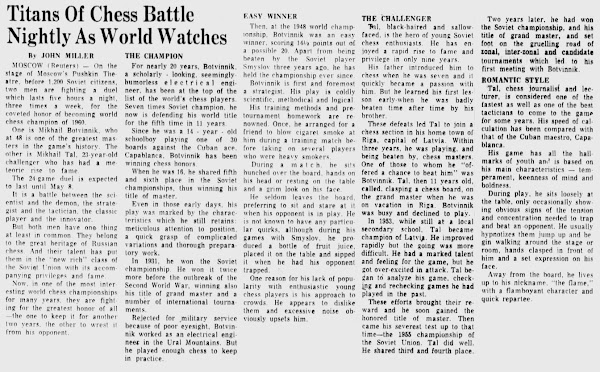
Titans Of Chess Battle Nightly As World Watches
By John Miller
MOSCOW (Reuters)-On the stage
On the stage of Moscow's Pushkin Theatre before 1200 Soviet citizens two men are fighting a duel which lasts five hours a night three times a week for the coveted honor of becoming world chess champion of 1960.
One is Mikhail Botvinnik who at 48 is one of the greatest masters in the game's history. The other is Mikhail Tal, 23-year-old challenger who has had a meteoric rise to fame.
The 24-game duel is expected to last until May 8.
It is a battle between the scientist and the demon, the strategist and the tactician, the classic player and the innovator.
But both men have one thing at least in common. They belong to the great heritage of Russian chess. And their talent has put them in the “new rich” class of the Soviet Union with its accompanying privileges and fame.
Now, in one of the most interesting world chess championships for many years, they are fighting for the greatest honor of all—the one to keep it for another two years, the other to wrest it from his opponent.
THE CHAMPION
For nearly 20 years, Botvinnik, a scholarly-looking, seemingly-humorless electrical engineer, has been at the top of the list of the world's chess players. Seven times Soviet champion, he now is defending his world title for the fifth time in 11 years.
Since he was 14-year-old schoolboy playing one of 30 boards against the Cuban ace, Capablanca, Botvinnik has been winning chess honors.
When he was 16, he shared fifth and sixth place in the Soviet championships, thus winning his title of master.
Even in those early days, his play was marked by the characteristics which he still retains, meticulous attention to position, a quick grasp of complicated variations and thorough preparatory work.
In 1931, he won the Soviet championship. He won it twice more before the outbreak of the second World War, winning also his title of grand master and a number of international tournaments.
Rejected for military service because of poor eyesight, Botvinnik worked as an electrical engineer in the Ural Mountains. But he played enough chess to keep in practice.
EASY WINNER
Then, at the 1948 world championship, Botvinnik was an easy winner, scoring 14½ points out of a possible 20. Apart from being beaten by the Soviet player Smyslov three years ago, he has held the championship ever since.
Botvinnik is first and foremost a strategist. His play is coldly scientific, methodical and logical.
His training methods are pre-tournament homework are renowned. Once, he arranged for a friend to blow cigarette smoke at him during a training match before taking on several players who were heavy smokers.
During a match, he sits hunched over the board, hands on his head or resting on the table and a grim look on his face.
He seldom leaves the board, preferring to sit and stare at it when his opponent is in play. He is not known to have any particular quirks, although during his games with Smyslov, he produced a bottle of fruit juice, placed it on the table and sipped it when he had his opponent trapped.
One reason for his lack of popularity with enthusiastic young chess players is his approach to crowds. He appears to dislike them and excessive noise obviously upsets him.
THE CHALLENGER
Tal, black-haired and sallow-faced, is the hero of young Soviet chess enthusiasts. He has enjoyed a rapid rise to fame and privilege in only nine years.
His father introduced him to chess when he was seven and it quickly became a passion with him. But he learned his first lesson early when he was badly beaten time after time by his brother.
These defeats led Tal to join a chess section in his home town of Riga, capital of Latvia. Within three years, he was playing, and being beaten by, chess masters. One of those to whom he “offered a chance to beat him” was Botvinnik. Tal, then 11 years old, called, clasping a chess board, on the grand master when he was on vacation in Riga. Botvinnik was busy and declined to play.
In 1953, while still at a local secondary school, Tal became champion of Latvia. He improved rapidly but the going was more difficult. He had a marked talent and feeling for the game, but he got over-excited in attack. Tal began to analyze his game, checking and rechecking games he had played in the past.
These efforts brought their reward and he soon gained the honored title of master. Then came his severest test up to that time—the 1955 championship of the Soviet Union. Tal did well. He shared third and fourth place.
Two years later, he had won the Soviet championship, and his title of grand master, and set foot on the grueling road of zonal, inter-zonal and candidate tournaments which led to his first meeting with Botvinnik.
ROMANTIC STYLE
Tal, chess journalist and lecturer, is considered one of the fastest as well as one of the best tacticians to come to the game for some years. His speed of calculation has been compared with that of the Cuban maestro, Capablanca.
His game has all the hallmarks of youth and is based on his main characteristics—temperament, keenness of mind and boldness.
DUring play, he sits loosely at the table, only occasionally showing obvious signs of the tension and concentration needed to trap and beat an opponent. He usually hypnotizes them jump up and begin walking around the stage or room, hands clasped in front of him and a set expression on his face.
Away from the board, he lives up to his nickname, “the flame,” with a flamboyant character and quick repartee.
May 04 1960
The Montgomery Advertiser, Montgomery, Alabama, Wednesday, May 04, 1960
Chess Championship Called At 41 Moves
Moscow (AP)-The 19th game in the World Chess Championship was adjourned after 41 moves Tuesday with challenger Mikhail Tal a pawn up on Mikhail Botvinnik, the defending champion, the Russian news agency Tass said.
Tal has 10½ points to 7½ for Botvinnik in the 24-game series.
May 09 1960
The Guardian, London, Greater London, England, Monday, May 09, 1960
Tal Becomes New Chess Champion of the World
By our Chess Correspondent
Mikhail Tal is the chess champion of the world. The twenty-first game of his match with Botvinnik ended in an uneventful draw on Saturday evening, leaving Tal the winner of the match by 12½ points to 8½.
Botvinnik has the right to a return match next year, and if Tal then retains his title he will be undisturbed until 1963, when he has to meet the winner of a new series of eliminating contests organized by the International Chess Federation.
Botvinnik won only two games, and the impression given by his play is that he is developing the chess equivalent of hardening of the arteries. His strategy was laboured, and there was usually a distinct deterioration in its quality in the fifth hour of the session, when the combined effects of tiredness and shorness of time made themselves felt.
Smyslov's Walk-Out
Tal also seemed rather overawed by the occasion, and the critics who claim that his play is essentially unsound will point to the sixth, eighth, ninth, and seventeenth games, in all of which Tal made sacrificial attacks which were or could have been clearly refuted by Botvinnik.
His end games, however, were generally of a higher quality than had been expected, in spite of a decentralising knight move in the fourth game which caused Smyslov to walk out of the hall in disgust.
Tal is only 23, and in the years to come we can expect him to add a sureness and depth of strategy to the tactical brilliance which is already so prominent. Whether or not he becomes one of the greatest world champions and dwarfs his contemporaries in the manner of Lasker and Alekhine will depend both on this and on what happens to the other outstanding grandmasters of his generation, Spassky and Fischer.
Mikhail Tal vs Mikhail Botvinnik
Botvinnik - Tal World Championship Match (1960), Moscow URS, rd 21, May-07
Queen's Indian Defense: Classical. Traditional Variation Main Line (E19) 1/2-1/2
June 30 1960
October 26 1960
A photo from the 14th Olympiad at Leipzig (October 26-November 9, 1960). Bobby Fischer read Tal's palm, peers into the future. 'I see that the next World Champion will be a young American! Tal immediately turned to William Lombardy and says, 'Congratulations, Bill!' On the left is Alexander Koblencs. Next to him is Mikhail Tal, followed by William Lombardy and Raymond Weinstein. The lady seated in the foreground is the wife of Vasily Smyslov, Nadezhda Andreevna.
October 31 1960
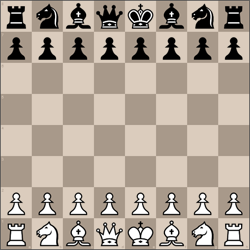
Mikhail Tal vs. Laszlo Szabo at the Leipzig Olympiad, October 31, 1960, Tal, one up.
November 01 1960
Robert James Fischer vs Mikhail Tal, November 01, 1960, XIV Chess Olympiad 1960 in Leipzig. Original b/w photo via German Federal Archive (Deutsches Bundesarchiv), by Ulrich Kohls. For fair use, all credits must be kept intact. Color photo version created by the developer (me, yours truly) of https://bobby-fischer-1960.blogspot.com (Source)
Robert James Fischer vs Mikhail Tal, November 01, 1960, Leipzig. Original b/w photograph via Leipzig City History Museum. For fair use, all credits must be kept intact. Color photo version created by the developer (me, yours truly) of https://bobby-fischer-1960.blogspot.com (Source)
Robert James Fischer vs Mikhail Tal, November 01, 1960, Leipzig. Original b/w photographer, undetermined. For fair use, all credits must be kept intact. Color photo version created by the developer (me, yours truly) of https://bobby-fischer-1960.blogspot.com
November 06 1960
















